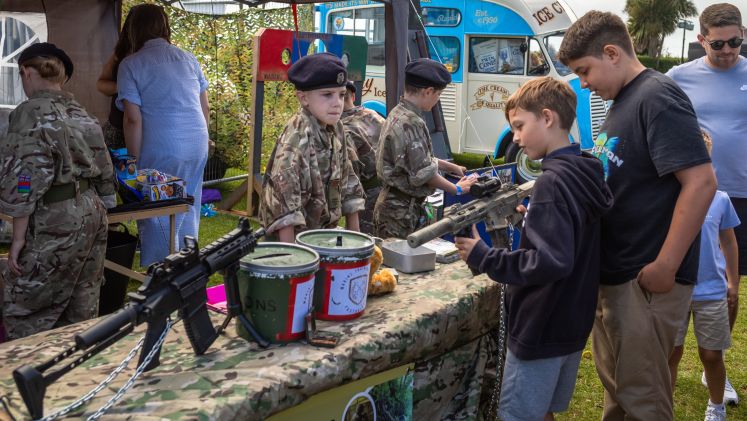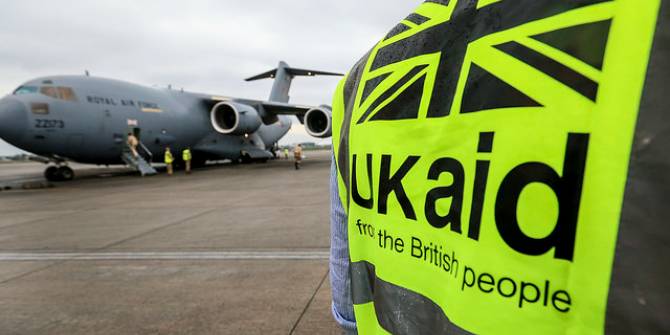 As the death toll of British and US/NATO forces rises every week, along with casualties amongst the insurgents and the Afghan population, Antonio Giustozzi reads the runes on whether a politically negotiated settlement is going to be feasible in Afghanistan. British officials and military have been amongst those pushing most strongly for talks with the Taliban to begin. So how do all the stakeholders in the conflict now line up on starting negotiations?
As the death toll of British and US/NATO forces rises every week, along with casualties amongst the insurgents and the Afghan population, Antonio Giustozzi reads the runes on whether a politically negotiated settlement is going to be feasible in Afghanistan. British officials and military have been amongst those pushing most strongly for talks with the Taliban to begin. So how do all the stakeholders in the conflict now line up on starting negotiations?
British soldiers currently make up around 10,000 of the 150,000-strong US and NATO forces in Afghanistan. At the G8 conference last month David Cameron said he wants British troops out of the country by the time of the next election (ostensibly 2015). But he also warned it would be a ‘difficult summer’ for UK troops. Meanwhile Liam Fox recently pledged in Washington to stand ‘shoulder to shoulder’ with the USA. Just this Tuesday the Taliban claimed credit for an attack on a Ghurka battalion in Helmand province that killed 3 British soldiers and raised the death toll for British soldiers in the country to 318.
Cameron insists that the attack by a ‘renegade’ Afghan soldier will not change the UK’s strategy of training local forces. But it must raise questions about whether NATO’s military engagement with the Taliban is a wise precursor to a British drawdown – particularly at a time when rumours concerning negotiations with the leadership of the Taliban circulate more and more insistently in Afghanistan. General Sir David Richards, head of the British Army recently said he sees ‘no reason’ why negotiations shouldn’t be opened, breaking with the previous Labour government’s insistence (at least in public) that talks with the Taliban leadership were out of the quesiton.
Certainly almost all the European capitals involved in Afghanistan are now in favour of a negotiated solution. British diplomats in particular have been playing a leading role in trying to convince the Americans that negotiations are feasible, not least at the last January’s London Conference on Afghanistan where the UK pushed for ‘conversation on reconciliation.’ President Karzai is advocating negotiations in his own way, and his recent sacking of his hardline anti-Taliban head of security and minister of interior might be seen as signal to them to reach a local deal.
Only Washington seems to hesitate, worried about the end result of any negotiating process. Throughout 2009 Washington seemed to be slowly moving towards accepting that talking to the leadership of the Taliban was possible, but over the last few months second thoughts have emerged. The divergence with London has been reported in the press over the last few weeks, with the US looking to weaken the Taliban through offensives in Helmand and Kandahar before talking with insurgent leaders.
A key issue that some in America and elsewhere raise is whether the Taliban are genuinely interested in negotiations and whether their leadership would be able to implement any agreement. The argument is that the Taliban being internally fragmented, it is not clear with whom the international community should negotiate. Some observers describe the Taliban as little more than an umbrella brand, incorporating disparate and even unrelated groups.
There is no question that the Taliban are not a centralised movement, but how ‘fragmented’ are they really? One can observe the relatively rapid transmission of tactics, technology and organisational practices across the different Taliban networks. It is also clear that Taliban ‘cadres’ are moved from one region to another, typically from the south (Helmand, Kandahar) to areas more recently invested by the Taliban, such as Wardak and Logar (in the Kabul region) during 2007-8, or Faryab and Kunduz (in the northern region) in 2009. This strongly suggests a centralised strategic planning, with the establishment of priorities and the ability to order members of the movement to deploy far from their homes.
At the same time, the various ‘shuras’ do claim an autonomous role and are very aware of their specific character and role. Friction between the Quetta Shura, the Miranshah Shura and the Peshawar Shura has emerged from time to time. However, the Taliban leadership has always been able to contain such friction, allegedly with a good degree of help from the Pakistani security services. The Pakistani military completely denied having any role in supporting the Afghan insurgency until last year. But they do now claim in confidential meetings that they have the ability to control the Afghan insurgents to a great degree.
Clearly, the Pakistanis are proposing themselves as potential brokers in future negotiations. They claim the leverage to convince or even force the Taliban and other insurgent groups to join the negotiating process; they could discipline the reluctant factions and individuals.
Considering how essential the Pakistani sanctuary is to the Afghan insurgents, it seems clear that if the Pakistani military strongly supported negotiations the Taliban would find it difficult to object. The Taliban might sabotage the negotiations in more subtle ways than simply refusing any approach, however. For example, they could raise preposterous issues or insist on marginal details being resolved, as well as imposing preconditions that Kabul or Washington would find impossible to agree to.
Negotiations on a political settlement of the Afghan conflict would be complex in any case, given that they would have to be multilateral. Consequently sabotaging them would be rather easy if any of the participants wanted to. William Dalrymple recently argued in The Guardian that NATO forces are stumbling around in what is really an India-Pakistan ‘proxy war’ in Afghanistan. In this view extensive India aid interventions in Afghanistan backing the Karzai government are designed to force Pakistan to a compromise over the apparently separate Indo-Pak conflict over Kashmir. Any such linkage could clearly muddy the waters for any local resolution in Afghanistan and might protract the time to a US and British bailout.
From what can be gathered, the leadership of the Taliban does not oppose negotiations in principle, but it is determined to win a major role in the post-conflict new order. Such a major role might be more than Washington and some other negotiating partners can stomach.
To learn more, see:
Masadykov, Talatbek and Giustozzi, Antonio and Page, James Michael (2010) Negotiating with the Taliban: toward a solution for the Afghan conflict. Crisis States Research Centre working papers series 2, 66. Crisis States Research Centre, London School of Economics and Political Science. Free download at http://eprints.lse.ac.uk/28117/








2 Comments